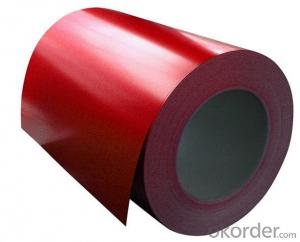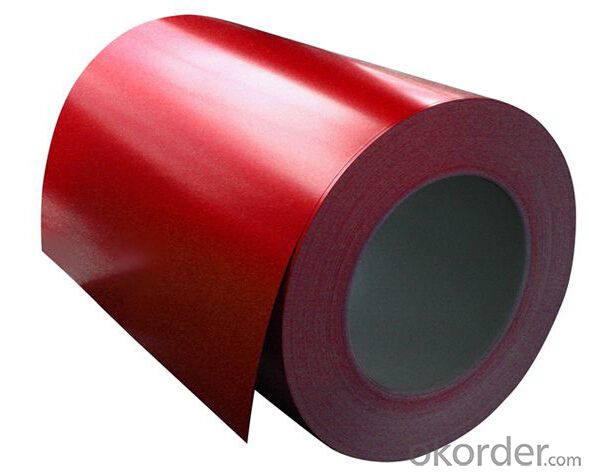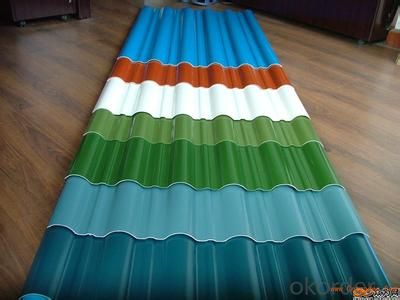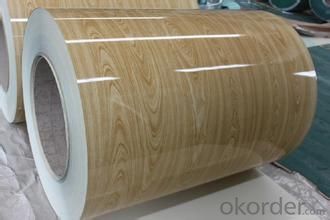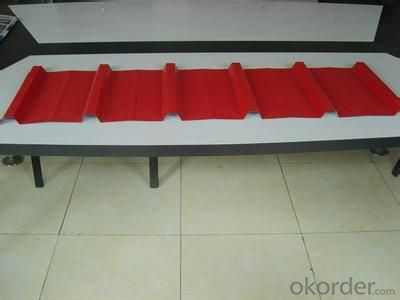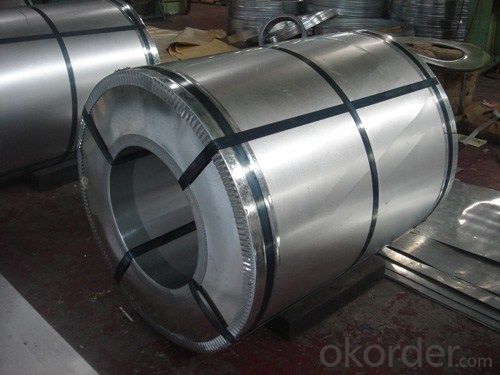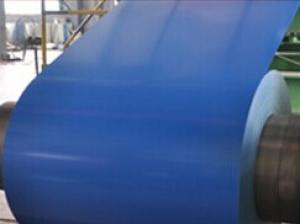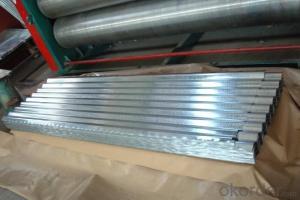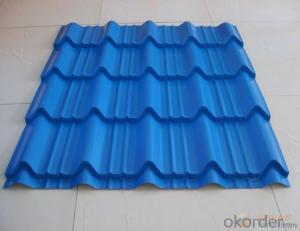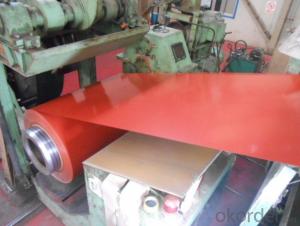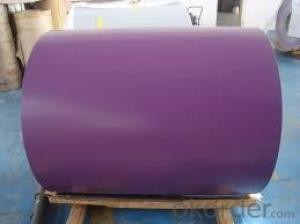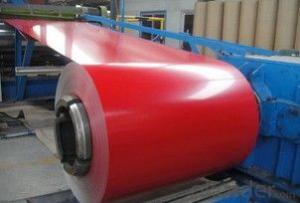Higher Quality Pre-Painted Galvanized/Aluzinc Steel Coil
- Loading Port:
- China main port
- Payment Terms:
- TT OR LC
- Min Order Qty:
- 50 m
- Supply Capability:
- 10000 m/month
OKorder Service Pledge
OKorder Financial Service
You Might Also Like
Higher Quality Pre-Painted Galvanized/Aluzinc Steel Coil
With GI as base material, after pretreatment (degrease and chemical treatment ) and liquid dope with several layers of color, then after firing and cooling, finally the plate steel is called pre-painted galvanized (aluzinc) steel. Pre-painted galvanized steel is good capable of decoration, molding, corrosion resistance. It generally displays superior workability, durability and weather resistance.
2.Main Features of the Pre-Painted Galvanized/Aluzinc Steel Coil:
• Excellent process capability
• Smooth and flat surface
• Workability, durability
• Excellent heat resistance performance
• High strength
• Good formability
• Good visual effect
3.Pre-Painted Galvanized/Aluzinc Steel Coil Images
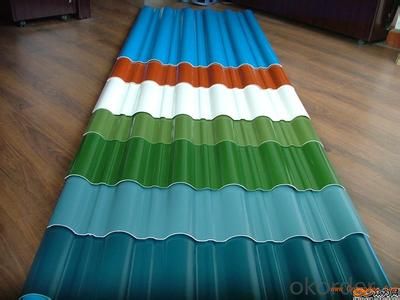
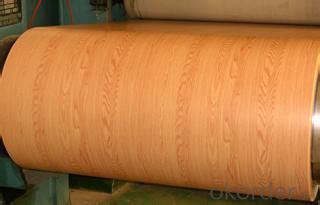
4.Pre-Painted Galvanized/Aluzinc Steel Coil Specification
Standard: AISI, ASTM, BS, DIN, GB, JIS
Grade: DX51D, DX52D
Thickness: 0.17-2.0mm
Brand Name: KMRLON
Model Number: coil
Type: Steel Coil
Technique: Cold Rolled
Surface Treatment: Coated
Application: Boiler Plate
Special Use: High-strength Steel Plate
Width: 20-1250mm
Length: customized
commoidty: pre-painted galvanized steel coil
Thickness: 0.13-4.0mm
width: 20-1250mm
zinc coating: 40-180g/m2
printing thickness: top side: 20+/-5 microns, back side: 5-7 microns
color: all RAL color
surface treatment: color coated
coil weight: 4-7 tons
coil ID: 508/610mm
packaging: standard seaworthy packing
5.FAQ of Pre-Painted Galvanized/Aluzinc Steel Coil
1. What’s the application of this product?
Roof, roof structure, surface sheet of balcony, frame of window, etc.
2. What’s the brand of the paint?
We use the best brand of all of the word—AKZO.
4. How to guarantee the quality of the products?
We have established the international advanced quality management system,every link from raw material to final product we have strict quality test;We resolutely put an end to unqualified products flowing into the market. At the same time, we will provide necessary follow-up service assurance.
5. How long can we receive the product after purchase?
Usually within thirty working days after receiving buyer’s advance payment or LC. We will arrange the factory manufacturing as soon as possible. The cargo readiness usually takes 15-25 days, but the shipment will depend on the vessel situation.
- Q: What are the different types of steel coil storage racks?
- There are several types of steel coil storage racks, including coil cradles, coil saddles, coil c-hooks, and coil racks with dividers.
- Q: How are steel coils used in the automotive stamping industry?
- Steel coils are used in the automotive stamping industry to provide a continuous supply of flat steel sheets that are then fed into stamping machines. These coils are unrolled, straightened, and then fed through the stamping presses to create various automotive parts, such as body panels, chassis components, and other structural parts. The use of steel coils ensures efficiency, precision, and a consistent quality in the production of automotive parts.
- Q: How are steel coils used in the production of heating systems?
- The production of heating systems relies on the utilization of steel coils in various ways. One primary application of steel coils in heating systems involves their incorporation in the construction of heat exchangers. Heat exchangers serve a vital purpose in the transfer of heat from one medium to another within the heating system. Typically, the steel coils are shaped into tubes or fins, which maximize the surface area for optimal heat transfer. In a typical heating system setup, the steel coils allow hot gases or liquids to pass through them, while another medium, such as air or water, flows over or through the coils. This arrangement facilitates the efficient transfer of heat energy from the hotter medium to the cooler one, effectively heating the air or water for distribution throughout the heating system. Steel coils are also employed in the production of radiant heating panels or floor heating systems in heating applications. In these instances, the steel coils are usually embedded within a panel or positioned beneath the flooring. When electricity or hot water passes through the coils, they heat up and emit heat to the surrounding environment. This particular heating system type boasts high efficiency and ensures a comfortable and evenly distributed heat output. Moreover, steel coils are integral components of heating systems such as boilers, furnaces, and heat pumps. These heating system units often require the use of steel coils due to their excellent heat transfer capabilities and durability. The integration of steel coils into the design of these units guarantees efficient and reliable heat generation and distribution. In summary, steel coils play a critical role in the production of heating systems as they enable efficient heat transfer, provide durability, and facilitate the generation and distribution of heat.
- Q: Already on my team is Empoleon lvl 82Heatran lvl 74Scizor lvl 34Magnezone lvl 38What other steel types should I choose?
- Metagross would help out a lot, Excadrill id you are not doing double battles... (two of his best moves for him hit his team and are ground.. ) if you do not want to rick excadrill use a Lucario instead for hs massive damage output.
- Q: How are steel coils used in the production of construction equipment?
- Steel coils are used in the production of construction equipment as they provide a reliable and cost-effective material for manufacturing various components. These coils are often processed and shaped into specific parts, such as frames, chassis, and heavy-duty structures, which make up the foundation and framework of construction equipment. The high strength and durability of steel coils ensure that the equipment can withstand heavy loads, extreme conditions, and repetitive use, making them essential in the construction industry.
- Q: Also, what is the top best slow cooker that is 100% stainless steel? Thank you!
- You do not want 100% stainless steel cookware, because it's a poor conductor of heat. All high quality stainless cookware is layered with stainless steel only on the exterior and interior surfaces, while having at least an internal heat spreading core of aluminum or copper. Not all stainless steel is sufficiently ferrous (magnetic) to work with electric inductive cooktops, so some stainless cookware adds an additional layer of ferrous steel in addition to the thermal cores. You also wouldn't want a slow cooker that's 100% stainless steel, because the uneven heating would cause food to burn more quickly. They are usually made of ceramic stoneware for a reason, even heating. Besides, a stainless pressure cooker (with alum/copper) core can in less than an hour everything a slow cooker does in 3+ hours, with better flavor, color, and nutritional content. By the way, the Prestige stainless cookware isn't 100% stainless, of course, and that's a GOOD thing.
- Q: What are the different types of coil recoiling machines?
- The different types of coil recoiling machines include manual coil recoilers, semi-automatic coil recoilers, and fully automatic coil recoilers.
- Q: If i get a samurai sword made of carbon steel, what is the hardest thing i can hit before it breaks? Or will it not break?
- Carbon steel is an alloy that is made up of the mixture of carbon and iron. In addition, several other elements with low maximum percentages are also included, such as manganese, with 1.65% maximum, silicon,with 0.60% maximum, and copper, with 0.60% maximum. Carbon Steel Pipe Fittings are utilized in a wide variety of applications across multiple industries. They are typically used in large shipyards, fabrication companies, chemical plants, oil refineries, machinery manufacturers, textile, and fluid transportation companies among others. They are highly cost-efficient and are much preferred over other fittings.
- Q: In what ways can steel fail in use of buildings ad what can be done to prevent it?
- First let us see what steel is made from. PIG IRON, which is put into a blast furnace with other things to get the impurities out. the very high grated of steed include TUNGSTEN CARBIDE STEEL, which is used to make tooling. down to lower grades of steel to make other things. the stronger the steel that is required the less impurities that are in it. different steels are treated with different elements depending on what the steel is going to be used for, So if steel is Incorporated into a building and say the building caught fire enough heat could be produced to actually soften the steel and result in failure. hope this helps. Dr Knowitall.
- Q: I have a knife with 154cm steel on it and I always here that you should put oil on it to keep it from rusting but I am just wondering what kind of oil? And how do I apply it and do I just leave it on there?
- I don't know that steel, or what kind of knife it is, but unless it is a kitchen knife use the same thing you would use on a gun. Use an oil that dries, like Eezox, or use paste wax, or BreakFree, or Corrosion X.
Send your message to us
Higher Quality Pre-Painted Galvanized/Aluzinc Steel Coil
- Loading Port:
- China main port
- Payment Terms:
- TT OR LC
- Min Order Qty:
- 50 m
- Supply Capability:
- 10000 m/month
OKorder Service Pledge
OKorder Financial Service
Similar products
Hot products
Hot Searches
Related keywords
